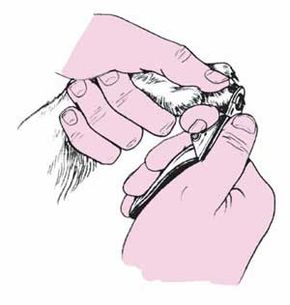There are numerous cat-health issues that an informed cat-owner must know. Consider these suggestions:
Worming medications are dangerous if used incorrectly. Never worm your cat with any medication not prescribed by your vet.
If a cat is too sick to clean itself, keep it brushed and rubbed down. Wipe runny eyes often.
To give a cat a pill, hold the animal firmly on your lap or between your knees. Grasp the head on either side of the jaw so that the cat has to open its mouth. Place the pill as far back in the throat as possible. Close the cat's mouth, and rub its throat gently to stimulate swallowing.
Cats are prone to diabetes. If your cat is diabetic, have your vet show you how to give the required insulin injections. If you do this faithfully, diabetes will not shorten your cat's life.
If a cat appears malnourished even though well fed, has frequent loose stools, a lackluster coat, and a bloated stomach, you should suspect worms. Consult a veterinarian.
Ear mites are a common problem with cats. If you notice black, brown, or gray waxy material in the ear instead of the usual clean pink surface, the cat may have mites. Consult the veterinarian for medicine. If you have more than one cat and one gets ear mites, chances are the others will, too.
If a cat's membranous eyelids half-cover its eyes, it's usually a sign of an intestinal illness that should be treated immediately.
Constant discharge from your cat's eye can be a symptom of either local infection or systemic disease that should be treated.
If a kitten dies suddenly with no sign of illness, it probably had feline distemper. Your other cats should be vaccinated immediately.
The easiest way to treat hairballs is to give the cat a preparation that will coat the stomach and combine with the hair so that it can be passed in the stool. White petroleum jelly is an excellent coating agent. Put a teaspoon or two on the cat's mouth and paws, and let the cat lick it off.
Cats love to play with yarn or string but such games can be fatal. If your cat has swallowed yarn or string, give it white petroleum jelly to ease the passage of the material through the system.
Keep cats away from the poisonous houseplants, such as dieffenbachia, mistletoe berries, and poinsettia.
Cats can be complex creatures -- but if cared for correctly, they also can provide enormous pleasure.
